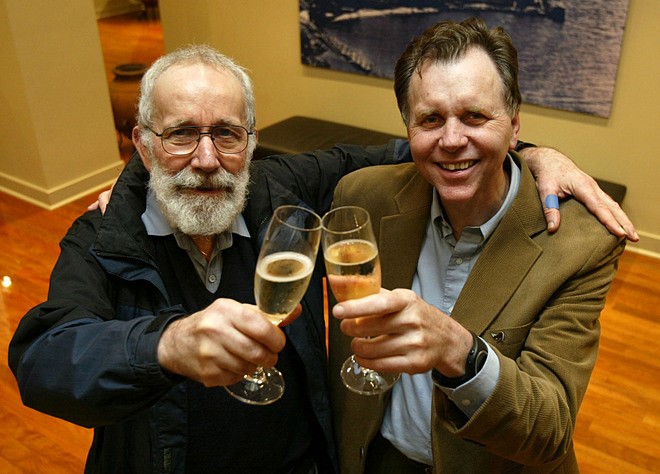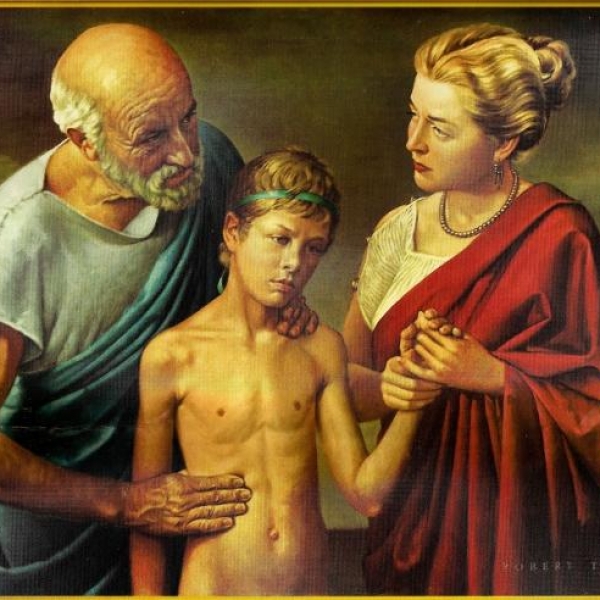Contact Admission
International Collaboration
The doctor took the body to test for infection
The doctor took the body to test for infection
Scoffed at by the scientific community to hypothesize the cause of stomach ulcers, Dr. Barry Marshall drank a bowl of soup containing H. pylori bacteria..
In the 1970s of the 20th century in Australia, one in 10 adults had gastric ulcers, most of them middle-aged men who regularly smoke and drink alcohol. For a century, scientists believed that the disease was caused by the overproduction of stomach acid, mental stress, and inheritance. At that time, the stomach was considered as a sterile environment.
In 1979, Robin Warren - a pathologist at Royal Perth Hospital - discovered bacteria in the intestines of a comma of 50% of the patients he biopsy samples. He also observed an important phenomenon: signs of infection always appeared in the stomach lining - close to the site of bacteria.
In 1981, Barry Marshall, a third-year student majoring in endocrinology was interested in Robin's discovery, so he met him. Both conducted studies, taking biopsies of 100 patients. After several attempts, Barry successfully cultured this comma-shaped bacterium. Bacteria are also found by Robin and Barry in the intestines of most patients with gastritis, duodenal ulcers, and stomach ulcers.
Both identified bacteria named H. pylori (Helicobacter pylori), suspected to be the cause of stomach ulcers.
A year later, Barry and Robin cultivated the first H. pylori bacteria on a petri dish, developing a hypothesis involving the bacteria that caused stomach ulcers. However, their hypothesis is mocked by scientists and doctors, no one believes bacteria can live in the acidic environment of the stomach.
"No one supported me, but then I knew I was on the right track," Barry said in a 1998 interview.
Undeterred, Barry went on to prove his hypothesis correct. He implanted H. pylori bacteria into mice and pigs, but there was no sign of infection in these animals. Results on animals are not as expected, nor allowed to experiment on humans, Barry increasingly desperate. Day ended when witnessing many patients had to have stomach amputated, or lose color and then die from illness, Barry decided to do experiments on his own body - the only patient he was allowed to test.

Certainly, his intestines did not have H. pylori bacteria, Barry took samples of cultured H. pylori bacteria, put them in a bowl of beef soup and drank, believing he would get a stomach ulcer after a year. After only 3 days, he began to feel nauseous, bad breath, diarrhea, exhaustion, and on day 5, vomiting. The endoscopy results showed that his stomach was inflamed due to infection.
Barry's study, published in the Medical Journal of Australia in 1985, was one of the most cited studies of that time. Barry and Robin have proven to the world that stomach ulcers are an infectious disease, saving many lives. This is considered the first step in the scientist's journey to discover stomach ulcers.
Barry and Robin continued to study more deeply over the next 10 years, concluding that patients with peptic ulcers can only be cured when the H. pylori bacteria in the intestine are completely destroyed.
Gradually, the medical community also accepted the findings of Barry and Robin, began testing for H. pylori bacteria to diagnose stomach ulcers, then proceeding with antibiotic treatment.
In 2005, Barry Marshall and Robin Warren were awarded the Nobel Prize in Biomedical Medicine for the discovery of H pylori bacteria that cause stomach ulcers.
When many people use antibiotics to treat stomach ulcers, it is estimated that the number of stomach cancer cases also decreases. Today, the World Health Organization (WHO) recognized H. pylori as a bacteria capable of causing carcinogens. The H. pylori bacteria damage the stomach lining, causing stomach ulcers, which can develop into cancer.
The discovery has great significance in the history of public health, saving the lives of many patients, thanks in part to the courageous act of Dr. Barry Marshall's willingness to do experiments on his own body.
Other news
- How Dangerous Is Nipah Virus? Medical Alert and Urgent Health Recommendations ( 14:13 - 27/01/2026 )
- Predicting Disease from Sleep – A New Breakthrough Study ( 14:01 - 13/01/2026 )
- Medical advances predicted to break through in 2026 ( 13:54 - 12/01/2026 )
- Vietnamese medical miracles in 2025 – inspiration for medical students ( 07:54 - 07/01/2026 )
- Updating the SOFA-2 Score: A New Standard in the Assessment of Multiple Organ Failure After Three Decades ( 10:40 - 31/12/2025 )
- Home AEDs: High Life-Saving Effectiveness, but Not Cost-Effective at Current Prices ( 14:12 - 18/12/2025 )
- Artificial Intelligence and Pediatric Care ( 08:27 - 16/12/2025 )
- Applying Clinical Licensing Principles to Artificial Intelligence ( 09:36 - 08/12/2025 )
- U.S. Approves Targeted Lung Cancer Therapy Datroway ( 08:43 - 25/06/2025 )
- Therapeutic potential and mechanisms of mesenchymal stem cell-derived exosomes as bioactive materials in tendon–bone healing ( 08:38 - 23/11/2023 )


















